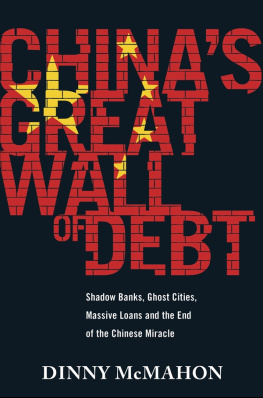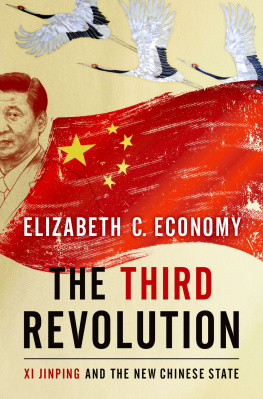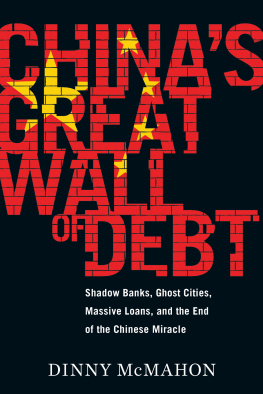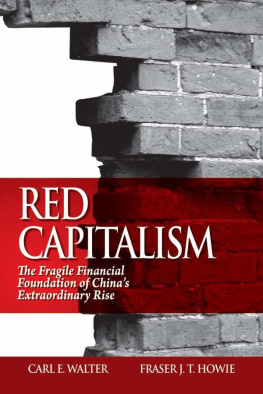PRAISE FOR CHINA: THE BUBBLE THAT NEVER POPS
Orlik covers complex debates in crystal-clear prose, spiced up with anecdotes from his years on the ground in China. His book serves as a primer on Chinas modern economic history, but, most importantly, lays out a strong contrarian case for why it can avoid a future crisis. Simon Rabinovitch, Asia economics editor, The Economist
No one is better equipped to help us understand and to prognosticate the outcome of Chinas debt problem than veteran analyst Tom Orlik. This book has a rare combination of intense focus on the details of this complex problem and a lucid style which makes it a fun and engaging read to the educated public. Readers should prepare themselves for a wild ride through the twists and turns of a potential Chinese financial crisis. Victor Shih, Ho Miu Lam Chair Associate Professor in China and Pacific Relations, UC San Diego
Orlik plucks vivid examples from all over China to tell the story of the economys remarkable rollercoaster ride. Beijing has defied the odds to survive four momentous economic cycles in forty years, Orlik explains. Aided by clear writing style and a healthy dose of good humour, he determines how China might reinvent its economy for a fifth time. Celia Hatton, Asia Pacific Editor, BBC
Thomas Orliks China: The Bubble that Never Pops provides a valuable historical overview of the build-up of debt in the worlds second-largest economy over the last two decades. The authors deep knowledge and perceptive analysis make the book a timely contribution to our understanding of Chinas state-capitalist financial system and inefficient allocation of capital.Minxin Pei, author of Chinas Crony Capitalism
Orlik takes a dispassionate look at how, despite massive debt, non-performing loans, white elephant projects, and infamous ghost cities, Chinas economy has defied all the nay-sayers at least for now. In China: The Bubble that Never Pops, Orlik offers an inventory of the policy tools often unavailable to western central bankers and political leaders that Chinas Party technocrats have used to manage the economy and prevent or forestall hard landings. Lucid and highly readable, this is one of those rare books that manage to be accessible to non-specialists while still offering ample detail and data to those steeped in the arcana of the Chinese economy.Kaiser Kuo, host of The Sinica Podcast on SupChina.com
Mr. Orlik does an excellent job of explaining why Chinas economy keeps confounding those who have predicted for years that it is a bubble about to pop. But he is no wide-eyed naif, rather he walks readers through all the issues and risks and help us understand how policymakers keep things together, while making clear that the risk of an eventual crisis is real. Bill Bishop, Publisher, Sinocism
Orlik musters his deep knowledge (and dry wit) to explain the stresses building beneath Chinas remarkable growth. The author mines his experiences as journalist and analyst covering China and Asia to provide clear comparative examples he deploys 1980s Japan, 1990s Korea, and the catastrophic sub-prime crisis in the US, to illuminate the decisions taken by Chinese policymakers. This book is an accessible primer for anyone who wishes to understand Chinas choices today.Lucy Hornby, China correspondent, Financial Times
China

Oxford University Press is a department of the University of Oxford. It furthers the Universitys objective of excellence in research, scholarship, and education by publishing worldwide. Oxford is a registered trade mark of Oxford University Press in the UK and certain other countries.
Published in the United States of America by Oxford University Press
198 Madison Avenue, New York, NY 10016, United States of America.
Oxford University Press 2020
All rights reserved. No part of this publication may be reproduced, stored in a retrieval system, or transmitted, in any form or by any means, without the prior permission in writing of Oxford University Press, or as expressly permitted by law, by license, or under terms agreed with the appropriate reproduction rights organization. Inquiries concerning reproduction outside the scope of the above should be sent to the Rights Department, Oxford University Press, at the address above.
You must not circulate this work in any other form and you must impose this same condition on any acquirer.
CIP data is on file at the Library of Congress
ISBN 9780190877408
eISBN 9780190877422
For Josephine, Saul, and Faith
Contents
Writing a book is hard. Writing a book about China is harder. I couldnt have done it without support over the years from colleagues on the economics team at Bloomberg, in the Wall Street Journal newsroom, and the Stone & McCarthy office. At Bloomberg in Beijing, I worked closely with Fielding Chen, Qian Wan, Justin Jimenez, and Arran Scott, benefiting from their deep reserves of expertise, and even deeper reserves of good humor. Stephanie Flanders and Michael McDonough gave me flexibility to pursue a book project at the same time as my day job. At the Wall Street Journal, I was lucky to have Andy Browne as bureau chief, Bob Davis, Liyan Qi, Bill Kazer, Aaron Back, Esther Fung, and Dinny McMahon as collaborators on the economics beat, Duncan Mavin and Carlos Tejada as editors, the opportunity to write for Josh Chins China Real Time blog, and research support from Lilian Lin. Working at Stone & McCarthy I benefited from the wisdom of Logan Wright and David Wilder, whose combination of enthusiasm and cynicism proved to be the correct attitude to sustain eleven years covering Chinas economy.
Everyone who follows the Chinese economy has benefited from the perceptive work and contrasting views of Nicholas Lardy and Barry Naughton. Their analytic chronicles of the reform era are required reading for all students of China, and significantly informed my thinkingas well as providing material for some of the historical sections of this book. Jason Bedford has dived deeper into the weeds of Chinas financial sector than most, and was generous enough to share some of his thinking. I learned from Jamie Rush and Chang Shus work on the impact of a China crisis on the rest of the world, David Qus expertise on Chinas approach to financial stability, and Dan Hansons analysis on the impact of the trade war.
The International Monetary Fund does excellent work on China; Ive benefited from reading a lot of it, and from speaking with some of the authors. Conversations with officials at the Peoples Bank of China, China Banking Regulatory Commission, China Securities Regulatory Commission, Chinese Academy of Social Science, and National Bureau of Statistics, gave me a window into the official perspective. Travel up and down the country, and meetings with local officials, bankers, businessmen, real estate developers, factory workers, and farmers added color and realism.
Weiyi Qiu provided professional research assistance, and Cecilia Chang contributed to sections on debt at state-owned enterprises. David Pervin at Oxford University Press gave wise counsel on the process and, together with Macey Fairchild, insightful comments on the draft. Bob Davis and Nicholas Lardy read through the near-final manuscript, saved me from some embarrassing errors, and made valuable suggestions that strengthened the text at key points. Damien Ma provided valuable feedback on the final chapter. This book would not have been possible without Zhang Ayi, who looked after our three children when my wife and I were working. My daughter Josephine wouldnt forgive me if I didnt acknowledge that she typed out the title.








